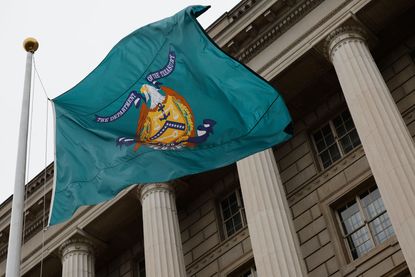America doesn't have a wealth tax. The Supreme Court might kill it anyway.
Justices are being asked to do something unusual: issue opinions about hypothetical legislation


Remember the wealth tax? It was a centerpiece of Sen. Elizabeth Warren's 2020 presidential campaign, but the proposal — like her candidacy — didn't end up going anywhere. But just because America doesn't actually have a wealth tax doesn't mean the Supreme Court can't rule it out of bounds. It just might do so, The Associated Press reported, in a new case "backed by business and conservative political interests."
The case involves a Washington state couple who were taxed $15,000 for their share of profits from an India-based farm equipment company, The Washington Post explained. Donald Trump's 2017 tax law created a "one-time tax on certain offshore earnings that had previously been exempt from taxation." But the couple, Charles and Kathleen Moore, say they never received the profits. They sued the government, arguing the Constitution's 16th Amendment doesn't permit Congress to tax "unrealized" income. (Lower courts have disagreed, so far.)
So how does the nonexistent wealth tax come into play? A lot of wealth — stocks, bonds, land and other assets — produce income only if sold. A wealth tax would go ahead and put a levy on their value anyway. As The New Republic's Matt Ford pointed out, the Moores' lawyers wrote a 2021 op-ed saying their lawsuit "stands to slam shut the door on a federal wealth tax" because it would sharply limit Congressional taxing powers under the 16th Amendment, which empowered the federal government to authorize income taxes. Still, Ford noted, justices are being asked to do something unusual: "The Supreme Court does not have the constitutional power to issue advisory opinions about hypothetical legislation."
Subscribe to The Week
Escape your echo chamber. Get the facts behind the news, plus analysis from multiple perspectives.

Sign up for The Week's Free Newsletters
From our morning news briefing to a weekly Good News Newsletter, get the best of The Week delivered directly to your inbox.
From our morning news briefing to a weekly Good News Newsletter, get the best of The Week delivered directly to your inbox.
Protecting America's 'richest citizens'
The Supreme Court is showing itself to be "an instrument to protect the wealth of America's corporations and its richest citizens," columnist Michael Hiltzik argued in the Los Angeles Times. The Constitution restricts justices to rulings on cases that affect "real people, not conjectural issues that might occur in the future." If the court invalidates a wealth tax before it even exists, the justices would "actually be legislating, which the Constitution forbids."
"The proper venue to settle the debate is Congress, not the Supreme Court," the Tax Foundation's Daniel Bunn wrote for The Washington Examiner, a conservative publication. Wealth taxes are "economically harmful and unconstitutional." But the best bet is for justices to issue an extremely narrow ruling. "The court must walk a fine line between endorsing wealth taxes and increasing uncertainty in the tax code."
But the problem isn't just the wealth tax, Ian Milhiser noted at Vox. A narrow decision favoring the Moores "could blow a huge hole in the federal budget." The specific, existing provision of tax law that they're challenging was expected to produce $340 billion in revenues to the U.S. government over 10 years. If the justices knock that down, "they could do considerable damage to the government's ability to fund itself."
'The quadrillion-dollar question'
On the other hand, The Hill reported, a broad ruling from the Supreme Court that strikes down all taxes on unrealized income could end up "pushing heaps of taxable income out of the government's reach." It's not just the wealth tax and the one-time repatriation tax that might be affected, but "large swaths of the international tax regime." The repercussions are potentially massive. "It's the million-dollar question, just with a few more zeros: the quadrillion-dollar question," said Harvard University's Thomas Brennan.
Some observers see even wider ripple effects. Brakeyshia Samms at the Institute on Taxation and Policy noted that "the average net worth of white households is 4.1 and 5 times that of Black and Hispanic households, respectively." Killing a wealth tax could hurt efforts to reduce that gap. Similarly, Amy Royce argued at Ms., the loss of revenue from an adverse court ruling would make it "even harder to persuade policymakers to invest in universal childcare, affordable housing, paid leave and more."
Even a narrow ruling would open the door to "more cases questioning the constitutionality of long-settled parts" of the tax code, Natasha Sarin wrote in The Washington Post. That would put the "stability of our tax system would be in doubt." The Supreme Court hears the case on December 5.

Continue reading for free
We hope you're enjoying The Week's refreshingly open-minded journalism.
Subscribed to The Week? Register your account with the same email as your subscription.
Sign up to our 10 Things You Need to Know Today newsletter
A free daily digest of the biggest news stories of the day - and the best features from our website
Joel Mathis is a freelance writer who has spent nine years as a syndicated columnist, co-writing the RedBlueAmerica column as the liberal half of a point-counterpoint duo. His work also regularly appears in National Geographic, The Kansas City Star and Heatmap News. His awards include best online commentary at the Online News Association and (twice) at the City and Regional Magazine Association.
-
 10 things you need to know today: December 3, 2023
10 things you need to know today: December 3, 2023Daily Briefing Gaza residents flee as Israel continues bombardment, Trump tells supporters to 'guard the vote' in Democratic cities, and more
By Justin Klawans, The Week US Published
-
 5 X-plosive cartoons about Elon Musk
5 X-plosive cartoons about Elon MuskCartoons Artists take on his proposed clean-up of X, his views on advertisers, and more
By The Week US Published
-
 2023: the year of superhero fatigue
2023: the year of superhero fatigueThe Explainer The year may represent the end of an era for Hollywood
By Brendan Morrow, The Week US Published
-
 Remembering former US Justice Sandra Day O'Connor, the first woman on the Supreme Court
Remembering former US Justice Sandra Day O'Connor, the first woman on the Supreme Courtthe explainer O'Connor played a pivotal role on the bench and was regarded as the one of the powerful women of her era
By Theara Coleman, The Week US Published
-
 Worklessness: a national 'scandal'
Worklessness: a national 'scandal'Talking Point One in five working-age adults in Birmingham, Glasgow and Liverpool are neither in work nor seeking work
By The Week UK Published
-
 Alleged Sikh assassination plot rocks US-India relations
Alleged Sikh assassination plot rocks US-India relationsTalking Point By accusing an Indian government official of orchestrating an assassination attempt on a US citizen in New York, the Justice Department risks a diplomatic crisis between two superpower
By Rafi Schwartz, The Week US Published
-
 Dublin riots: a blow to Ireland’s reputation
Dublin riots: a blow to Ireland’s reputationTalking Point Unrest shines a spotlight on Ireland's experience of mass migration
By The Week UK Published
-
 Henry Kissinger dies aged 100: a complicated legacy?
Henry Kissinger dies aged 100: a complicated legacy?Talking Point Top US diplomat and Nobel Peace Prize winner remembered as both foreign policy genius and war criminal
By Harriet Marsden, The Week UK Last updated
-
 The Supreme Court could reign in the SEC — and federal agencies as a whole
The Supreme Court could reign in the SEC — and federal agencies as a wholeTalking Point The court is hearing arguments on the agency's ability to enforce financial penalties
By Justin Klawans, The Week US Published
-
 'Germs can, in fact, be good'
'Germs can, in fact, be good'Instant Opinion Opinion, comment and editorials of the day
By Harold Maass, The Week US Published
-
 How a long-term truce in Gaza could have ripple effects across the Middle East
How a long-term truce in Gaza could have ripple effects across the Middle EastTalking Point Israel and Hamas have recently agreed to extend their peace for two more days
By Justin Klawans, The Week US Published










